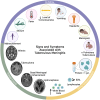Tuberculous Meningitis Across the Lifespan
- PMID: 40197992
- PMCID: PMC12128070
- DOI: 10.1093/infdis/jiaf181
Tuberculous Meningitis Across the Lifespan
Abstract
Tuberculous meningitis remains the most lethal form of tuberculosis. Despite significant physiological differences adults and children with tuberculous meningitis receive similar treatment and are often grouped together in research. Consequently, differences in tuberculous meningitis characteristics across the lifespan are poorly understood but may be relevant to developing more effective and age-appropriate interventions. In this review we discuss potential age-specific considerations in pathogenesis and pathophysiology, and review literature over the last 5 years to describe clinical characteristics, management, and outcomes across age groups. Children aged <5 years are vulnerable to tuberculosis disease and dissemination due to an immature immune system and the developing brain is highly susceptible to injury associated with neuroinflammation, leading to a greater likelihood of disability that has lifelong impact. Amongst adults, those with human immunodeficiency virus and older people are at greatest risk of death, but more research into the frequency of neurocognitive disability is needed.
Keywords: adults; children; outcome; pathogenesis; tuberculous meningitis.
© The Author(s) 2025. Published by Oxford University Press on behalf of Infectious Diseases Society of America.
Conflict of interest statement
Potential conflicts of interest. All authors: No reported conflicts of interest. All authors have submitted the ICMJE Form for Disclosure of Potential Conflicts of Interest. Conflicts that the editors consider relevant to the content of the manuscript have been disclosed.
Figures


References
-
- World Health Organization . Global tuberculosis report 2024. Geneva: World Health Organization, 2024.
-
- Chiang SS, Khan FA, Milstein MB, et al. Treatment outcomes of childhood tuberculous meningitis: a systematic review and meta-analysis. Lancet Infect Dis 2014; 14:947–57. - PubMed
Publication types
MeSH terms
Grants and funding
LinkOut - more resources
Full Text Sources

